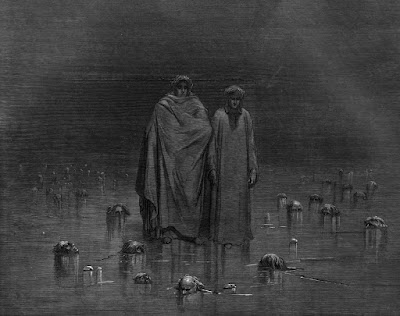,%20Museo%20Nazionale%20di%20Capodimonte,%20Napoli.jpg) |
| The Death of Julius Caesar by Vincenzo Camuccini (1771-1844), Museo Nazionale di Capodimonte, Napoli |
In ancient Rome, every month had an ides, sort of a midpoint, but not exactly. It was usually the thirteenth, but the fifteenth for four months (March, May, July, and October). The ides were sacred to Jupiter and religious observances were held to him on those days. The ides of March was also known for settling debts, and possibly because of that was chosen as the date for the assassination of Julius Caesar in 44 BC.
After returning to Rome from his success in Gaul, Julius Caesar declared himself dictator for life, understandably angering other powerful figures who were trying unsuccessfully to suppress him, people whose power were lessened as a result. Caesar enlarged the senate, created necessary government reforms, rebuilt cities and granted citizenship to foreigners living in Rome, all seen as positive developments. Things that needed to be done were getting done, but not everyone was pleased by Caesar's path. Less than a year after his declaration, on the ides of March, Senators Marcus Junius Brutus and Gaius Cassius led a group of approximately 60 conspirators in the fatal stabbing of Julius Caesar, causing a civil war that shaped the Roman Empire that replaced the Republic. This was a significant event in human history because of the longevity and influence of the Roman state, and the effect it had echos throughout the world even to this day. For those who scoff at this I would remind them of the extensive Roman influences in modern language, architecture, engineering, religion, law, and structures of government. This is true of other ancient civilizations as well, but the impact of Rome is not something that can be ignored by anyone with an adequate education.
 |
| Vercingetorix Throws Down his Arms at the Feet of Julius Caesar (1899) by Lionel Noel Royer (1852-1926), Musée Crozatier, Le Puy-en-Velay |
My thoughts on the ides of March do touch on the greater political and historical aspects, but also on the cultural significance of the act itself. I'm not the only one to dwell on this, and by a great margin, not the greatest thinker to do so. In Dante's Inferno, Canto XXXIV describes the Fourth Ring of the Ninth Circle of Hell. As Dante and Virgil advance through the cold mist toward an indistinct giant figure, they see the souls of sinners trapped in ice beneath their feet. These are the souls of the most evil of sinners, those who betrayed their benefactors. Nearing the giant figure at the very center of the lowest level of Hell, they recognize it as Satan himself. He is terrifying and gigantic, and has three faces. Each mouth is chewing on a soul, the three greatest sinners within human history, all traitors to their benefactor: Judas Iscariot, Marcus Junius Brutus and Gaius Cassius. That, in Dante's perspective, Brutus and Cassius shared the fate of Judas Iscariot and warranted the direct attention of Satan himself illustrates the seriousness of their actions. The betrayal of a benefactor, a benevolent leader, is such a dishonorable act that both Christians and the pagans that came before them can clearly agree on the level of contempt such an act deserves.
 |
| Dante and Virgil traversing the frozen Cocytus River in the underworld from Gustave Doré's 1857 illustrations for Dante's Inferno |
Most of the self proclaimed revolutionaries I've encountered, and the people who support them, did not come from the proletariat that they seem to think they are defending. They were mostly effete professors or spoiled university students whose bourgeois parents were paying for their education and lodging while they went slumming, always having a room to go back home to on the holidays. They enjoyed a bourgeois lifestyle while doing whatever they could to undermine the system which made it possible. They ignored the past and very predicable future outcomes of their chosen ideology, which would include the proactive destruction of the middle class (including their parents and themselves) and, ironically, the oppression of the masses. I suppose they all think they will be become post-revolution party leaders or something along those lines, but that certainly won’t happen for most of them, as history has shown, the revolution always devours its children.
 |
| Lucifer gnawing on the souls of traitors in the Ninth Circle of Hell from Gustave Doré's 1857 illustrations for Dante's Inferno |
The sin of betraying a benefactor, whether it be Jesus Christ, Julius Caesar, or one’s parents, who are doing the best they can for their children, is serious not only because of the dishonor involved, but because it is a vital part of the self-destructive ideological dogmas that are saturating the world today. To tear down a nation without using an army, they first need to turn it against itself and its citizens’ own best interests. For that, they need people to betray their benefactors. That they will ultimately falter is little compensation for what will be lost during the process.
Honor your benefactors. Honor family that support and love you. Remember the sacrifice of the Christ, and remember the ides of March.
~ By Lucian









